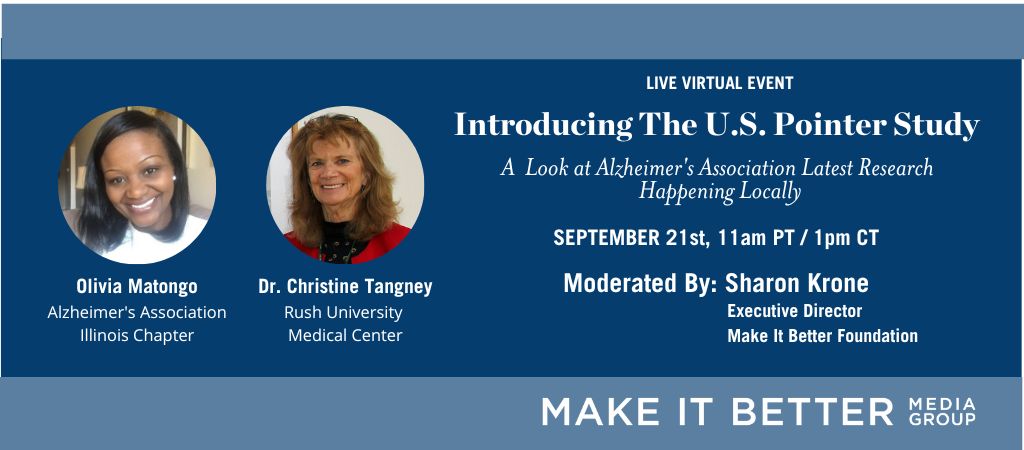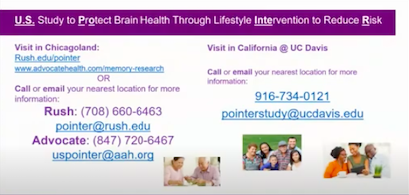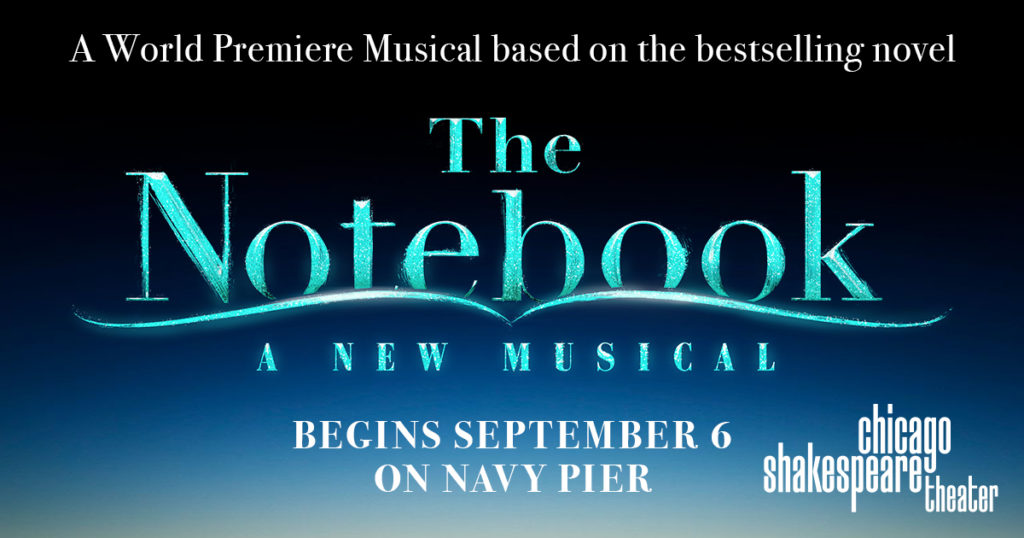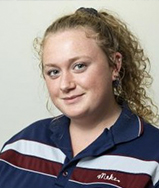Six million people in the United States are currently living with Alzheimer’s, a disease that is also the sixth leading cause of death in this country.
To discuss on the future of Alzheimer’s research and the introduction of The U.S. POINTER Study, two leaders in the field, Olivia Matongo, Vice President of Programs at the Alzheimer’s Association and Dr. Christy Tangney, Professor in the Departments of Clinical Nutrition & Preventive Medicine at Rush University Medical Center, joined Make It Better Media Group for a Sept. 21 virtual event, moderated by Sharon Krone, Executive Director of the Make It Better Foundation. Here are some key takeaways from the enlightening conversation.

Research Examines Lifestyle Choices That Impact Brain Function
The panelists highlighted the role lifestyle choices, such as physical fitness, nutrition, social activities and management of heart health, to name a few, can have on brain function.
“Let’s look at the problem, we have a lot of folks today, as we get older, that probably have adopted a very sedentary lifestyle,” said Dr. Tangney. “Our food culture has changed over the last three to four decades, dramatically. Snacking has become a prevalent activity … and the types of foods many people are exposed to are a tremendous affront to our overall health.”
The POINTER Study
Research has shown that maintaining a diet that promotes general health has been correlated to reducing cognitive decline. These findings tied to the positive impact of healthy diet and lifestyle choices laid the groundwork for The U.S. Study to Protect Brain Health Through Lifestyle Intervention to Reduce Risk, or The POINTER Study, a clinical trial for people aged 60 – 79 that is the “first study to examine combined interventions for dementia in a large-scale, diverse population in the United States.”
“We are really tapping on the community base infrastructure so that [POINTER] is truly successful — and as successful as the FINGER Trial was — that we really have a way to sustain that approach and make it accessible to everyone in the community,” Dr. Tangney said. “That is one of the most important things, when we learn a lot in science it’s no good if it can’t be translated, communicated and made accessible to our community individuals.”
The FINGER Study
Another study that has impacted the Alzheimer’s community at large is The FINGER Study, or The Finnish Geriatric Intervention Study to Prevent Cognitive Impairment and Disability — “the trial is the first randomized controlled trial showing that it is possible to prevent cognitive decline using a multidomain lifestyle intervention among older at-risk individuals,” states the Alzheimer’s Association website.
Ancillary Studies
In addition, the Alzheimer’s Association has a number of ancillary studies that tackle vulnerable aspects of living with Alzheimer’s, including neurovascular and sleep studies. A stand-out program that digs into an aspect of health overlooked by many is The POINTER-Microbiome Study — or gut study — that examines the effects of dietary interventions to understand how “variations in the gut relate to cognitive decline.” Matongo added that individuals enrolled in The POINTER Study are also eligible to participate in the ancillary studies.
Diversifying the Ranks of Local and International Studies
Currently, The POINTER Study has 1,600 enrolled participants, and it is Dr. Tangney’s hope to raise that number to 2,000. “There is an urgent need to expand this work and test the general adaptability and sustainability of the [studies]. The model is now being replicated in the United States, Europe, South America, Asia, Australia — including populations from a variety of geographical and cultural backgrounds,” said Matongo.
Both panelists emphasized the importance of diverse, cultural-specific feedback from countries and communities where the methods have been instituted. And, as Matongo and Tangney agreed, the field is only at the very beginning of deciphering this data’s impact and whether or not these studies flourish in countries so unlike America — where, for one, balanced diets might be more adhered to, unlike the food-obsessed culture of America.
Back in the States, The POINTER Study is continuing to expand their reach and have put the call out for “a wide variety of volunteers, in particular those of diverse backgrounds and under-represented populations, [which] is essential to exploring new approaches and strategies to advance Alzheimer’s research and address scientific gaps.”

“In the end, what comes out of the study is helpful to everyone. So the more diversity that we have, the more helpful it is to us overall. We’re taking care of each other, really, is what it works out to be,” concluded Matongo.
Watch the discussion below:
How To Support Alzheimer’s Research
The panelists highlighted the important partnerships between Alzheimer’s Association, RUSH and other organizations like Crock Community Center and Advocate Health Care that have the collective impact of enhanced support of the organizations and the communities they serve. To support the missions of the Alzheimer’s Association, RUSH and Worldwide FINGER, head to each of their respective websites. For those looking to take direct action, there are a few ways to do so.
Join or Support the Walk to End Alzheimer’s

For a limited time, for every donation made to the Chicago, Lake County, and North Shore Walk to End Alzheimer’s events, Make It Better Media Group will match each donation — up to a total of $10,000 raised between September 26 – 30. Sign up or donate.
Purchase Discounted Tickets with Proceeds Benefitting Alzheimer’s Association

Additionally, Better is pleased to partner with Chicago Shakespeare Theater to offer audiences a special way to give back to the Alzheimer’s Association when they experience the world premiere of The Notebook, a new musical based on the bestselling novel that inspired the iconic film. This story about the enduring power of love and memory features music and lyrics by multi-platinum singer-songwriter Ingrid Michaelson and a book by playwright Bekah Brunstetter (writer and producer on NBC’s This Is Us). Now through October 16, use promo code LOVE to unlock discounted tickets to The Notebook with 10% of ticket proceeds donated to the Alzheimer’s Association. Book online or call the box office at 312-595-5600.
More on Alzheimer’s:
- Maria Shriver on Her Quest to Cure Alzheimer’s
- Know the Signs: 10 Warning Signs of Alzheimer’s to Look Out for, From the Alzheimer’s Association
- Younger-Onset Alzheimer’s Disease Is Surprisingly Prevalent — Lorenzo’s House Is Providing Hope and Support for Families of Those Affected
- New Alzheimer’s Drug Aduhelm Stirs Hope, Controversy
- These Illinois Women Touched by Alzheimer’s Are Leading the Charge to Raise Awareness and Find a Cure
- Fighting Alzheimer’s Disease: One Caregiver’s Story
More from Better:
- How to Help Those Affected by Hurricane Fiona and Aid Response Efforts in Puerto Rico and Dominican Republic
- Going Sober in October: Help Yourself and Others Feel Better This Fall
- Support a Thriving Garfield Park Community: Donate or Register Now for Breakthrough’s Annual Benefit

Margaret Smith is a Chicago-based writer and editor with a passion for socio-political storytelling about their community. They are a graduate of Columbia College Chicago.

